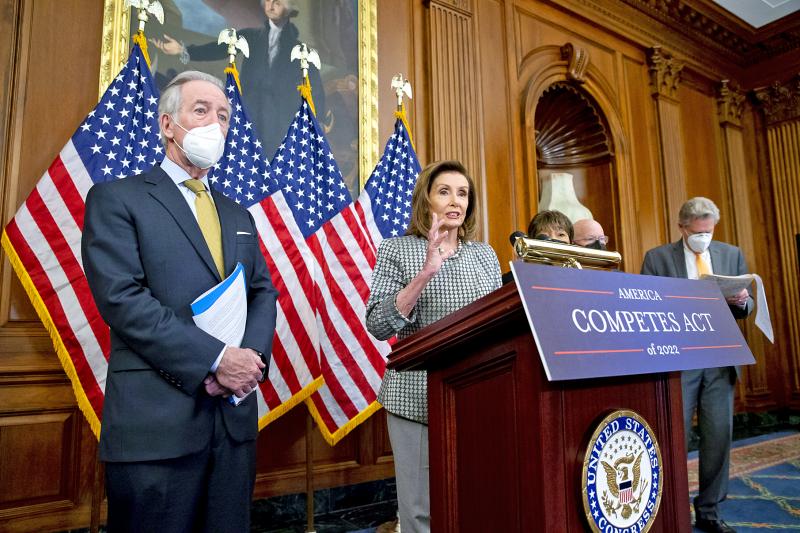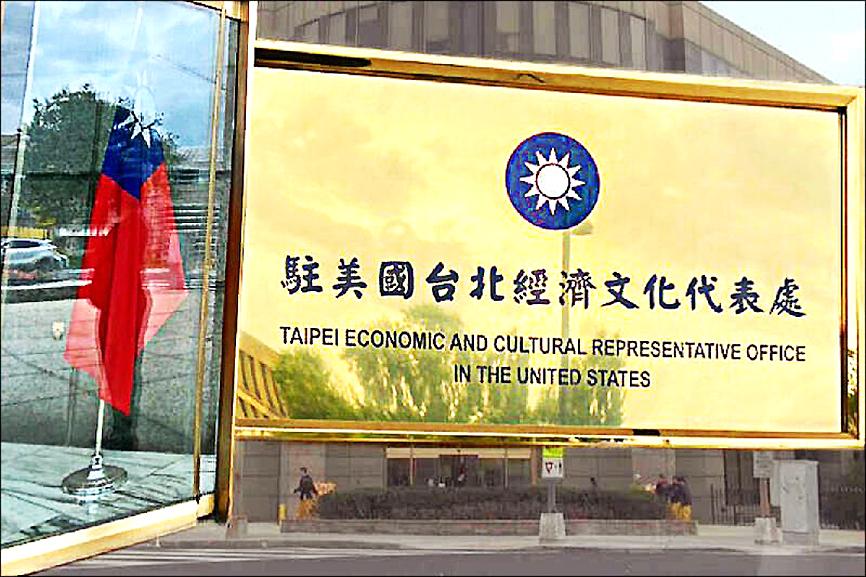The US House of Representatives on Friday narrowly passed a multibillion-dollar bill aimed at increasing US competitiveness with China and boosting domestic semiconductor manufacturing, despite Republican opposition.
The Democratic-majority House backed the “America COMPETES Act of 2022” by 222 to 210, almost entirely along party lines.
One Republican joined Democrats in voting for the measure, and one Democrat voted against.

Photo: EPA-EFE
The vote took place hours after the opening ceremony for the Beijing Winter Olympics, amid criticism in the US Congress of the International Olympic Committee for awarding the Games to China.
Human rights groups have long criticized China’s rights record, allegations China denies.
The bill’s passage by the House set up negotiations with the US Senate on a compromise version of the legislation, which must pass both chambers before it can be sent to the White House for US President Joe Biden to sign.

Photo: Lu Yi-hsuan, Tapei Times
The talks could take weeks or months, although Biden urged quick action in a statement praising what he called “vital” legislation.
“Every day we delay we fall farther behind, and that increases our domestic national security risk,” US Secretary of Commerce Gina Raimondo told a news conference.
The House bill authorizes almost US$300 billion for research and development, including US$52 billion to subsidize semiconductor manufacturing and research into the key components. It also earmarks US$45 billion over six years to ease supply chain problems that have exacerbated shortages.
It includes changes to US trade rules intended to offset China’s market distorting trade practices, including by strengthening antidumping rules.
The bill would authorize US$8 billion in US contributions to the Green Climate Fund, established by the Paris Agreement to combat climate change and help developing countries cope.
House Speaker Nancy Pelosi told reporters before the vote that she intended to begin negotiations with the Senate quickly.
“It is about making America ... self-sufficient when it comes to the supply chain, so that we’re not depending on other countries,” she said.
Raimondo said companies had told the White House that without the chips funding, they would build new plants outside the US.
The Semiconductor Industry Association praised the bill.
Arizona Technology Council president Steve Zylstra said the bill was “profoundly important” to the state’s ambitions of becoming the center of excellence for semiconductors in the US, after Intel Corp and Taiwan Semiconductor Manufacturing Co (台積電) have announced plans to build new plants there.
House Republicans complained that Democrats did not include them in drafting the legislation.
They harshly criticized the climate provisions, saying that they could be used to help Beijing, and accused Democrats of using the China measure to advance parts of Biden’s economic agenda that could not pass the Senate.
House Democrats said Republicans had refused to engage with them while they wrote the legislation.
The bill includes all or part of more than 60 smaller measures that Republicans had cosponsored, they added.
The Senate passed its own bill — the “US Innovation and Competition Act” — by 68 to 32 in June last year. Eighteen Republicans joined every Senate Democrat in voting “yes.”
That legislation includes US$52 billion to increase domestic semiconductor production, and authorizes US$190 billion for US technology and research to compete with China.
The House bill also includes some pro-Taiwan provisions previously initiated by lawmakers.
These include the draft “Taiwan Fellowship Act,” “Taiwan Diplomatic Review Act,” “Taiwan Peace and Stability Act” and “Taiwan International Solidarity Act,” as well as the Taiwan Allies International Protection and Enhancement Initiative (TAIPEI) Act.
The Taiwan Diplomatic Review Act asks the US secretary of state to negotiate a name change for the Taipei Economic and Cultural Representative Office in the US, Taiwan’s de facto embassy in Washington.
In Taipei, the Ministry of Foreign Affairs thanked the US Congress for its continuous efforts to deepen Taiwan-US relations through legislation and other actions that demonstrate strong support for Taiwan.
The ministry said it would monitor the follow-up review of the House bill and maintain close contact with friends in Congress to deepen the close partnership between the two countries.
Democratic Progressive Party (DPP) spokeswoman Hsieh Pei-fen (謝佩芬) said in a news release that the DPP appreciates the House’s cross-party support for Taiwan and looks forward to the continued deepening of bilateral relations with the US.
Hsieh said that many breakthroughs in Taiwan-US relations in the past few years have depended on congressional support, for which the DPP is deeply grateful.
Additional reporting by CNA

MAKING WAVES: China’s maritime militia could become a nontraditional threat in war, clogging up shipping lanes to prevent US or Japanese intervention, a report said About 1,900 Chinese ships flying flags of convenience and fishing vessels that participated in China’s military exercises around Taiwan last month and in January have been listed for monitoring, Coast Guard Administration (CGA) Deputy Director-General Hsieh Ching-chin (謝慶欽) said yesterday. Following amendments to the Commercial Port Act (商港法) and the Law of Ships (船舶法) last month, the CGA can designate possible berthing areas or deny ports of call for vessels suspected of loitering around areas where undersea cables can be accessed, Oceans Affairs Council Minister Kuan Bi-ling (管碧玲) said. The list of suspected ships, originally 300, had risen to about 1,900 as

Japan’s strategic alliance with the US would collapse if Tokyo were to turn away from a conflict in Taiwan, Japanese Prime Minister Sanae Takaichi said yesterday, but distanced herself from previous comments that suggested a possible military response in such an event. Takaichi expressed her latest views on a nationally broadcast TV program late on Monday, where an opposition party leader criticized her for igniting tensions with China with the earlier remarks. Ties between Japan and China have sunk to the worst level in years after Takaichi said in November that a hypothetical Chinese attack on Taiwan could bring about a Japanese

Right-wing political scientist Laura Fernandez on Sunday won Costa Rica’s presidential election by a landslide, after promising to crack down on rising violence linked to the cocaine trade. Fernandez’s nearest rival, economist Alvaro Ramos, conceded defeat as results showed the ruling party far exceeding the threshold of 40 percent needed to avoid a runoff. With 94 percent of polling stations counted, the political heir of outgoing Costa Rican President Rodrigo Chaves had captured 48.3 percent of the vote compared with Ramos’ 33.4 percent, the Supreme Electoral Tribunal said. As soon as the first results were announced, members of Fernandez’s Sovereign People’s Party

MORE RESPONSIBILITY: Draftees would be expected to fight alongside professional soldiers, likely requiring the transformation of some training brigades into combat units The armed forces are to start incorporating new conscripts into combined arms brigades this year to enhance combat readiness, the Executive Yuan’s latest policy report said. The new policy would affect Taiwanese men entering the military for their compulsory service, which was extended to one year under reforms by then-president Tsai Ing-wen (蔡英文) in 2022. The conscripts would be trained to operate machine guns, uncrewed aerial vehicles, anti-tank guided missile launchers and Stinger air defense systems, the report said, adding that the basic training would be lengthened to eight weeks. After basic training, conscripts would be sorted into infantry battalions that would take